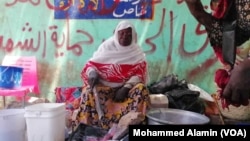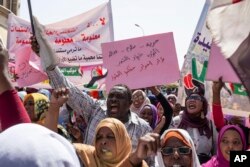Protesters in Sudan’s capital, Khartoum, have been holding a sit-in since April 6, demanding the military hand power to civilians. The demonstrators have been sustained through lengthy negotiations and armed attacks by donations of food and drinks, many distributed by an extraordinary tea seller.
Awadeya Mahmoud begins her day at 5 in the morning next to Khartoum University, across from Sudan’s Defense Ministry, surrounded by thousands of protesters.
Wearing a colorful blue Toab, a traditional Sudanese robe with head covering, and sitting in the middle of a makeshift kitchen, the 61-year-old and four young, female aides cook up to 10,000 meals daily.
The women cook potatoes, vegetables, beans and waika, a traditional Sudanese dish made with dry meat.
Supported by donations from food makers, Mahmoud has been distributing the free meals for protesters since April 12, a day after the military ousted President Omar al-Bashir from three decades in power.
The protesters are demanding the Transitional Military Council hand power to civilians. The military has agreed – but only if it can hold the majority of seats on a ruling council, which protest leaders reject.
While the stand-off drags out, protesters at the sit-in depend on Mahmoud’s support.
She says the youth who are guarding the barricades need food and drinks so they can be strong enough to stay there the whole night.
The tea and other drinks from Mahmoud and her team are key for protesters to avoid dehydration. Most days, the temperature in Khartoum peaks above 40 degrees Celsius or 104 degrees Fahrenheit.
Protester Wail Mohamed Abdullah says Mahmoud is not just giving them sustenance but also inspiration.
"We regularly come to eat at the place of Aunt Awadia, the mother of our revolution," he says. "She makes everything - including food, tea, coffee and other drinks. She helps us a lot, says Abdullah, and is here until dinner and sometimes even late into the night. So, we really appreciate her spirit of camaraderie."
Mahmoud understands the hardship faced by those who take on the power of the Sudanese state from personal experience.
She was among hundreds of thousands displaced by conflict in Sudan’s South Kordofan region, on the border with South Sudan, and became a roadside tea seller to support her family.
It is not the first time Mahmoud has taken a lead role and been recognized as an inspiration.
Mahmoud founded the Women’s Food and Tea Sellers’ Cooperative, which represents thousands of displaced and migrant women who depend on selling tea to survive.
The U.S. State Department in 2016 gave her the International Women of Courage Award for supporting women tea sellers and in other informal professions.
An assistant to Mahmoud, Muna Alamin, says she is optimistic that - with their help - Sudan’s revolution against tyranny can be achieved.
"We come to serve our nation," says Alamin, "and we ask God to help us achieve our goals of freedom, peace and justice for all the Sudanese people."
Despite Sudanese security forces’ attempts to clear the sit-in by force, Mahmoud and her team insist they will keep serving meals to protesters until they reach their shared goal – a return to democracy.
"We came here to help our sons and daughters in creating a new Sudan that we dream to make," says Mahmoud:" A new Sudan that treats all of us as equal citizens and gives us free healthcare and education."
She stressed that a new government should support Sudan’s poor people, end oppression, drop all laws against women, and increase its female representation.
Until those goals are achieved, says Mahmoud, they’ll keep serving food and tea to protesters.







